THE ASPHALT JUNGLE released June 1, 1950

"The Asphalt Jungle" was Marilyn Monroe's 8th on screen appearance. In half of those pictures her role was so small that she received no on screen credit and the others completely forgettable small roles.
Back in "Marilyn's first motion picture, 1947's "Dangerous Years", the new movie actress had been 14th billed as "Evie-Waitress at the Gopher Hole". In "The Asphalt Jungle" Monroe was billed 11th, but with full cast credit in her first major supporting role as "Angela Phinlay".
In this film noir classic Marilyn Monroe was under the direction of John Huston who chose her..Marilyn is seen above with Louis Calhern.
If you're early career was going to be associated with one specific motion picture. 'The Asphalt Jungle" was the right choice. The feature was nominated for three awards at the Venice Film Festival and won two. The screenplay won the prestigious Edgar Allan Poe award. The movie received four Academy Award nominations, a British Academy of Film and Television Arts (BAFTA) nomination, three Golden Globe nominations and two nominations from the Writers Guild of America.

The award nominated screenplay was by Ben Maddow, and John Huston. It takes an unflinching look at a group of men coming together to pull off a jewelry store robbery. The audience meets each member of the group and the actual robbery takes a full 11 taut minutes to show.
However, the motion picture industry's own censors, the Production Code Administration, wanted to cut two "Objectionable" scenes and change some dialogue.
The major studios had set up the code in the 1930's to protect the morality of Americans and it became even stronger after World War 2/ When "The Code" became part of the basis for the "Black Listings". However, in this case Huston and producer Arthur Hornblow, Jr. won and the film stayed as written, directed and edited.
The main cast of characters:
Sterling Hayden was "Dix Handley", Louis Calhern was "Alonzo D. Emmerich", Jean Hagen was "Doll Conovan"
Below Hagen and Hayden,

James Whitmore was "Gus Minissi"

Sam Jaffe was "Doc Erwin Riedenschneider"
John McIntye was "Police Commissioner Hardy".
When "Doc Riedenschneider" is released from prison after serving a 7 year sentence. He goes to a "Bookie" named "Cobby" portrayed by Marc Lawrence on the far right.
"Doc" wants "Cobby" to arrange a meeting with Lawyer "Alonzo Emmerich". Meeting "Emmerich", "Doc" explains his plans to rob a jewelry store of $500,000 in merchandise. Should that seem not much to my reader, if you convert that 1950 value to 2019. The half million dollar heist is worth $5,244,315 as of this writing.

"Doc" needs $50,000 from "Emmerich" to hire three men. These are a "Boxman (Safecracker)". a "Driver" and a Hooligan (Ordinary Hoodlum)"."Emmerich" agrees to give "Doc" the money and dispose of the "Loot" after the successful robbery.
After getting the money "Doc" hires a "Boxman" named "Louis Ciavelli" portrayed by Anthony Caruso, lower right.

The driver is hunchback "Gus Minissi" and the "Hooligan" is "Dix Handley". "Dix's" girlfriend, who is actually in love with him, is "Doll Conavan" and unlike the others in the group. "Dix" dreams of buying back the Kentucky horse farm his father lost during the "Great Depression".
During John Huston's 11 minute robbery sequence, that the censors thought made crime look good, "Ciavelli" hammers through a brick wall to enter the jewelry store, deactivates the only alarm to let "Doc" and "Dix" in and makes home made "Soup (nitroglycerin)" to blow the safe.
Everything is running like clockwork until the unexpected happens. It is not the arrival of a Security Guard, BUT the dropping of his gun. The gun goes off after hitting the ground and wounds "Ciavelli" in the stomach. "Ciavelli", "Doc" and "Dix" escape in the car driven by "Gus", but now a police manhunt is started.
"Ciavelli" insists that "Gus" take him home. Meanwhile "Doc" and "Dix" take the stolen goods and head for "Emmerich's". "Emmerich", who is actually broke, had sent a Private Detective name "Bob Brannon", portrayed by Brad Dexter, to collect debts owed him. "Brannon" returned without any money, but "Emmerich" plots with him to double cross the others
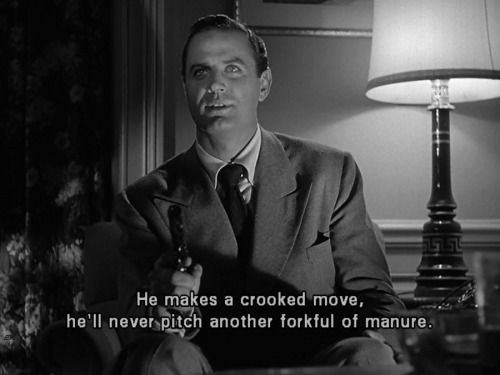
"Doc" and "Dix" arrive and "Emmerich" suggests the two leave the jewels with him. Both men now become suspicious and "Brannon" pulls a gun, but "Dix" is too fast and kills the detective.
Thinking fast, "Doc" tells "Emmerich" to contact the Insurance Company and ask for 25 percent to return the stolen items. "Emmerich" next disposes of "Brannon's" body in the river, but the body is discovered by the police.
ENTER MARILYN MONROE.
Her character of "Angela Phinley" is the mistress of "Alonzo Emmerich". When questioned by the police. He tells them he was with her at the time of the robbery. "Emmerich" contacts "Angela" to set up an alibi for him when the police arrive.

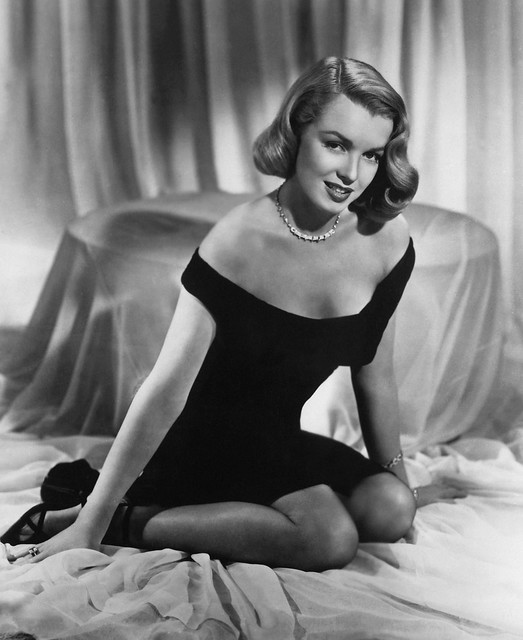
IN THE END:
A Police Lieutenant named "Ditrich", portrayed by Barry Kelley, beats a confession out of "Cobby".

Only to have himself arrested by Police Commissioner "Hardy" for corruption, because he was protecting, for money, the bookie.
"Hardy" arrests "Emmerich" and tells "Angela" its best for her to tell the truth about what she knows. "Emmerich" is permitted to leave the room for a minute, but commits suicide. The other sequence "The Production Board" objected too, because it showed a crook beating the law..
The Police are seen breaking down "Louis Ciavelli's" door. Only to discover his funeral is in progress.
"Doc" hires a cab to take him out of state and when they stop at a Diner to eat. Two police officers recognize him and make the arrest.
"Dix" and "Doll" head for Kentucky in a car. However, he was shot by "Brannon" and passes out from loss of blood. "Doll" takes him to a doctor that calls the police after examining the gunshot wound. "Dix" and "Doll" manage to get away and make it to his father's horse farm. Where he dies from loss of blood.
On October 13, 1950 Marilyn Monroe appeared with 9th billing as "Miss Casswell" in the classic drama about a fading Broadway star "Margo Channing" portrayed by Bette Davis. "Margo" feels threatened by fanatical fan "Eve Harrington" portrayed by Anne Baxter. The motion picture was "All About Eve". It was a small role for Monroe, but in her few scenes she stood out and it wasn't just for her looks.
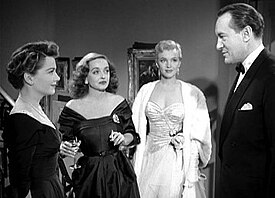
Above left to right: Anne Baxter, Bette Davis, Marilyn Monroe and George Sanders.
Marilyn's agent at the time was the Vice-President of the William Morris Agency Johnny Hyde. On the strength of those two performances. Hyde was able to get Monroe, in December 1950, a 7 year contract with 20th Century Fox. Sadly, a few days later he died of a massive heart attack at the age of 55. This left the young actress devastated.
As a 20th Century Fox contract player Marilyn appeared in comedy and drama as assigned. She followed "All About Eve" with a forgotten 1951 film "Home Town Story". The movie was described as a comedy, romance, drama and Monroe had fifth billing. Another comedy had her in sixth billing and one in fourth.
Then came director Fritz Lang's 1952 "Clash By Night" with the young actress cast in 4th billing behind Barbara Stanwyck, Paul Douglas and Robert Ryan. She played Keith Andes' girlfriend "Peggy" and the billing was more because of her growing popularity than the role's size. As Andes role was much larger and more important to the story and he was billed 7th.
Then came another mostly forgotten dramatic role that jumped Marilyn Monroe from fourth and fifth to second billing.
DON'T BOTHER TO KNOCK released July 18, 1952
"Don't Bother To Knock" is interesting in its choice of British director Roy Ward Baker. Who directed the John Mills World War 2 movie "Operation Disaster". About a crew of a submarine trapped on the ocean's floor. In 1958 he would direct the excellent story of the Titantic, "A Night to Remember", based upon Walter Lord's straight account of the sinking. Baker would go on to direct British Horror films.
The screenplay was by Daniel Taradash a perfect choice. Prior to this picture Taradash had written the screenplay for the Humphrey Bogart and John Derek 1949 drama "Knock On Any Door". Along with director Fritz Lang's 1952 Marlene Dietrich Western "Rancho Notorious" and would follow this film with the screenplays for 1953's "From Here to Eternity" and 1956's "Picnic".
The Cast
Marilyn Monroe was "Nell Forbes".
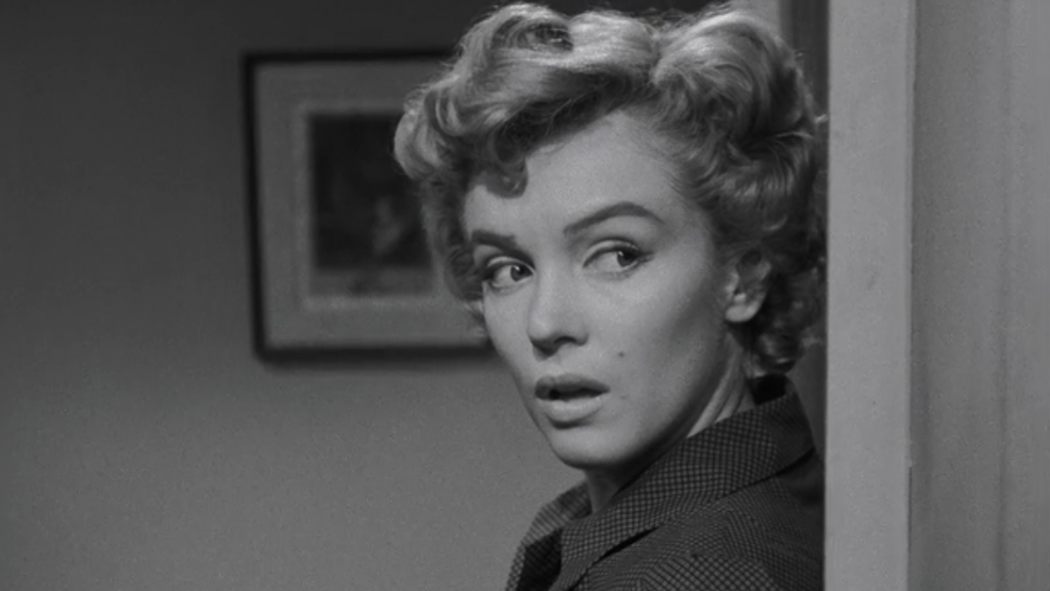
Below Richard Widmark was "Jed Towers" and Anne Bancroft was "Lyn Lesley". This was the future Tony Award winning, Oscar nominated, actresses first motion picture.
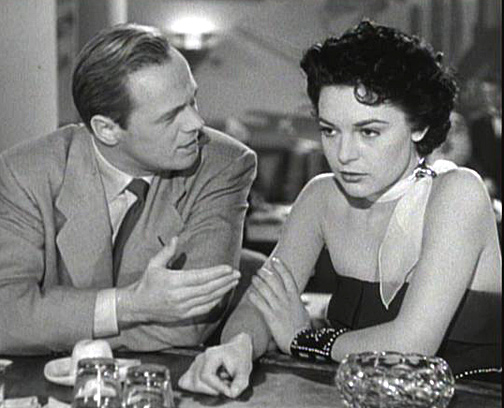
The elevator operator, "Eddie Forbes", was portrayed by the excellent character actor Elisha Cook, Jr.. While, Jim Backus portrayed "Peter Jones" and Lurene Tuttle portrayed his wife "Ruth Jones".
Donna Corcoran's "Bunny" is the daughter of "Peter" and "Ruth". Donna Corcoran's younger sister, Noreen, played the daughter on television's "Bachelor Father" starring John Forsythe. Her younger brother, Kevin, was "Moochie" on several different Disney shows like "Spin and Marty" and the original movie "The Shaggy Dog". Then there was her even younger brother, Kelly, who was on the Western television series "The Road West" starring Barry Sullivan.
Verna Felton was "Emma Ballew". Felton appeared on both "The Jack Benny Show" from its start on radio in 1939 to the end of its television run in 1963. She was also on the television series "December Bride", but her voice talents were used in animated features such as Walt Disney's 1941 "Dumbo" as "Mrs. Jumbo". While 1951 heard her as "The Fairy Godmother" in "Cinderella" and the following year she voiced the "Queen of Hearts" in "Alice in Wonderland". Among other television voice roles including "The Flintstones".
Jeanne Cagney, younger sister of James and director William, portrayed the hotel operator "Rochelle".
The plot of the motion picture takes place entirely within the New York City McKinney Hotel. It opens with "Lyn Lesley", the hotel's bar singer, wondering if airline pilot "Jed Towers" will show up? She sent him a letter ending their six month affair, but still has feelings for him. He does and she explains the reason she sent him the letter was because he lacks an understanding heart.
As the two are talking at the bar. In another part of the hotel the elevator operator "Eddie" introduces his very shy niece "Nelly" to "Peter and Ruth Jones". "Nelly" could be a possible babysitter for their daughter "Bunny" that night. While her parents attention a function being held in the hotel's banquet room.
After "Bunny" is suppose to be asleep. "Nell" starts trying on her mothers lacy negligee and using her perfume.

Seeing "Nell" directly from his room located opposite of the one for the "Jones Family". "Jed" calls her up and wants to come over, but she's not interested. Just as "Nell" puts down the receiver "Eddie" shows up to check on how's she doing and is appalled to find her wearing "Ruth's" clothing. "Eddie" orders "Nell" to take them off and tells his niece she can get such things by finding another boyfriend. The audience now discovers that her former one was killed. After "Eddie" leaves. "Nell" calls "Jed" to come over.

"Nell" lies to "Jed" claiming she is a guest of the hotel and is shocked to hear he's a pilot. Her boyfriend Phillip died in a plane crash. At this point "Bunny" comes out of her room and tells "Jed" the truth about "Nell".

In a fury "Nell" grabs "Bunny" and violently shakes her and orders her back to bed. However, "Jed" comforts the girl and tells her she can stay up. As "Bunny" is looking out of the hotel room window. "Nell" appears to want to push her out of it, but "Jed" snatches the girl away. The incident is witnessed by long time hotel guest "Emma Ballew" from below.

"Nell" escorts "Bunny" back to bed and warns her that something could happen to her favorite toy, IF she causes "Nell" anymore trouble.
"Jed" has decided to go back to "Lyn", if she'll have him. "Nell" comes out of the bedroom and wants to kiss "Jed". He stops her and notices scars on "Nell's" wrists and is told she had attempted suicide after Phillip's death.
"Eddie" comes to the room to check on "Nell" and is upset, because she is still wearing "Ruth's' clothing. He also rubs the lipstick off her mouth and becomes suspicious that there might be somebody in the bathroom in which "Jed" is hiding.

"Nell" grabs an ashtray and hits "Eddie" with it. Telling him he is acting like her repressive parents.
"Jed" emerges to attend to the elevator operator. Then things really come to a head as the suspicious "Emma Ballew" gets her husband, played by Don Beddoe, to accompany her to the room. As they knock "Eddie" convinces "Jed" to go into the bedroom to hide and he goes into the closet. In the dark "Jed' doesn't notice that "Bunny" is gagged and tied up.
When the "Ballew's" see "Jed" exit from a door to the adjoining room. They assume that he's holding "Nell" and "Bunny" captive and go for the hotel detective. Back in the bar "Jed" is telling "Lyn" about "Nell" and what had happened in the hotel room. Suddenly he realizes that "Bunny" was in the wrong bed and something isn't right. Meanwhile, "Nell" has finally completely lost reality believing "Jed" is "Phillip".
"Ruth" arrives at her hotel room, before "Jed". "Ruth" screams when she sees "Bunny" and grabs at "Nell". The two women are fighting as "Jed' arrives and pulls "Nell" away. When he goes to untie and free "Bunny". In the confusion that all of this is causing as :Eddie" also appears. "Nell" is able to slip away as the hotel detective finally gets to the room.
"Eddie" reveals that is niece spent the last three years in a mental hospital, but he didn't want anyone to know out of fear of loosing his job. Downstairs "Nell" steals some razor blades from the hotel lobby and plans on committing suicide
Everyone has left the hotel room and finds the girl. They surround her in the hotel lobby and "Lyn" attempts to calm "Nell" down, but "Nell" removes one of the razor blades to use on herself. "Jed" starts speaking and convinces "Nell" he isn't Phillip and to give him the blades. He then tells her to go with the police officers, when the arrive, so they can get her the help she needs. "Lyn" finally realizes that "Jed" has empathy and reconciles with him.
On February 15, 2011 film critic Dennis Schwartz wrote a review of "Don't Bother to Knock" for "Ozus World Movie Reviews". Schwartz stated it was a:
Wacko psychological thriller, set entirely in a NYC hotel, and helmed without urgency by Roy Ward Baker (The Vault of Terror/Asylum/Scars of Dracula). It lacks emotional depth, but is diverting as it gives off nervous energy and remains watchable throughout. Marilyn Monroe was in 12 previous films, but this was her first co-starring headliner role. Playing someone mentally deranged, Marilyn wonderfully channels how her mentally troubled mom acted and gives a believable performance (she's the best reason for seeing this forgettable pic). It's based on a novel by Charlotte Armstrong and is written by Daniel TaradashI fully agree with his review except for one point. Marilyn Monroe was in 17, not 12 previous films.
One forgettable anthology motion picture, 1952's "O'Henry's Full House", later and the comic talents of Monroe were in full view.
MONKEY BUSINESS released September 5, 1952.
Because of the title "Monkey Business". The film is often confused with the 1931 Marx Brothers comedy of the same name and therefore is referred too as "Howard Hawks' Monkey Business".
Hawks had made two classic comedies in the past. The first is the still a great screwball comedy from 1938 "Bringing Up Baby". The feature starred Cary Grant and Katherine Hepburn. The second is the 1940 comedy/drama "His Girl Friday" starring, once again Grant, but this time with Rosalind Russell. However, Howard Hawks believed the premise of this picture was unbelievable and thought the movie wasn't as funny as it could have been.
The problem wasn't his leading man, Cary Grant, who was in fine form, but most critics think his first leading lady Ginger Rogers. There just wasn't the right chemistry between the two, but when Marilyn was on with Cary. Their chemistry sent out sparks.
Hawks had just directed one segment of five, each by a different director, for "O'Henry's Full House", but not the Monroe and Charles Laughton sequence. In July his excellent version of the A.B. Guthrie, Jr. novel "The Big Sky", starring Kirk Douglas, had been released. The idea of another screwball comedy appealed to him.
The screenplay was written by three perfect choices. Broadway playwright Ben Hecht had written both the original novel and the screenplay for 1932's "Scarface" directed by Hawks. He co-wrote the original 1937 "A Star Is Born", wrote the original treatment for 1939's "Gunga Din" and without credit polished up the screenplay for John Ford's "Stagecoach". In 1940 Hecht co-wrote the screenplay for Hawks' "His Girl Friday". Later he actually wrote the script for Howard Hughes 1943 "The Outlaw", but Hughes' name, only, appears as screenplay writer. Among Hecht's other work was polishing the screenplay for Howard Hawks' 1951 "The Thing from Another World" and for his third time working with Alfred Hitchcock on 1951's "Strangers On A Train". At the end of his career Ben Hecht would have over 165 screen writing credits.
The second screen writer was Charles Lederer. Who also worked with Hawks on 1940's "His Girl Friday" and 1951's "The Thing from Another World". Between those two films Lederer wrote the screenplay for the Howard Hawks 1949 comedy "I Was a Male War Bride" starring Cary Grant and Ann Sheridan.
The final writer was I.A.L Diamond. After this motion picture and 4 others. Diamond would write the screenplays for the following Billy Wilder directed motion pictures, 1959 "Some Like It Hot", 1960's "The Apartment", 1961's "One, Two, Three"1963's "Irma la Douce"1964's "Kiss Me Stupid", 1966's "The Fortune Cookie", 1970's "The Private Life of Sherlock Holmes", 1972's "Avanti", 1974's "The Front Page", 1978's "Fedora" and 1981's "Buddy. Buddy".
The Cast
Cary Grant was "Dr. Barnaby Fulton". Note the thickness of his glasses. Grant was in the middle of a string of comedy motion pictures. So his needed timing was perfected.

Ginger Rodgers was his wife "Edwina Fulton". Rodgers was also appearing in comedy roles prior to this film. So her timing should have been perfect, but this was a screwball, old style, 1930's comedy and not the Hollywood formula comedies of the early 1950's Rodger's was appearing in. It really wasn't the actresses fault for the criticism.

Charles Colburn was an old pro and had appeared in comedy, drama and adventure movies over his career. He knew just how to play the straight man to Cary Grant and the others as "Fulton's" boss "Oliver Oaxley".
Then there was Marilyn Monroe as "Lois Laurel", "Oaxley's" secretary. Monroe's comic talent had been seen in some of her previous motion pictures, but they were all formula 1950's productions like Ginger Rodgers had been in. With "Monkey Business", unlike Rodgers, the actress understood the concept of screwball comedy and Howard Hawks turned her loose to, at times, steal the picture by saying her line straight and not reacting to Cary Grant at all.

Absent minded chemist "Dr. Barnaby Fulton" is attempting to develop for the "Oaxley Company" an elixir of youth. His boss is urging him on. While thinking of the profits such a product will bring the company. "Esther", one of the test chimpanzees has gotten loose. "Esther" than proceeds to mix a bunch of chemicals together and puts the mixture into the water cooler.

Unaware of what "Esther" has done. "Dr. Fulton" decides to test his latest mixture on himself and then washes it down with water from the cooler. The result is that he is now acting like a 20 year old.
Next "Fulton" spends part of the day with the bosses Secretary "Lois Laurel". The chemistry between Monroe and Grant goes full speed. Below "Fulton" trades his car for a 1950's "Hot Rod".



"Edwina Fulton" learning that the elixir works. Take the flask and drinks some and also washes it down with water from the water cooler. She starts acting like a 20 year old school girl prankster and even calls her ex-boyfriend, "Hank Entwhistle", played by Hugh Marlowe.

Soon others from the company drink out of the cooler and act younger, but which each drink the same character takes. They become even younger until they're acting like elementary grade children. Below Grant, Marlowe and a group of kids playing Cowboys and Indians.
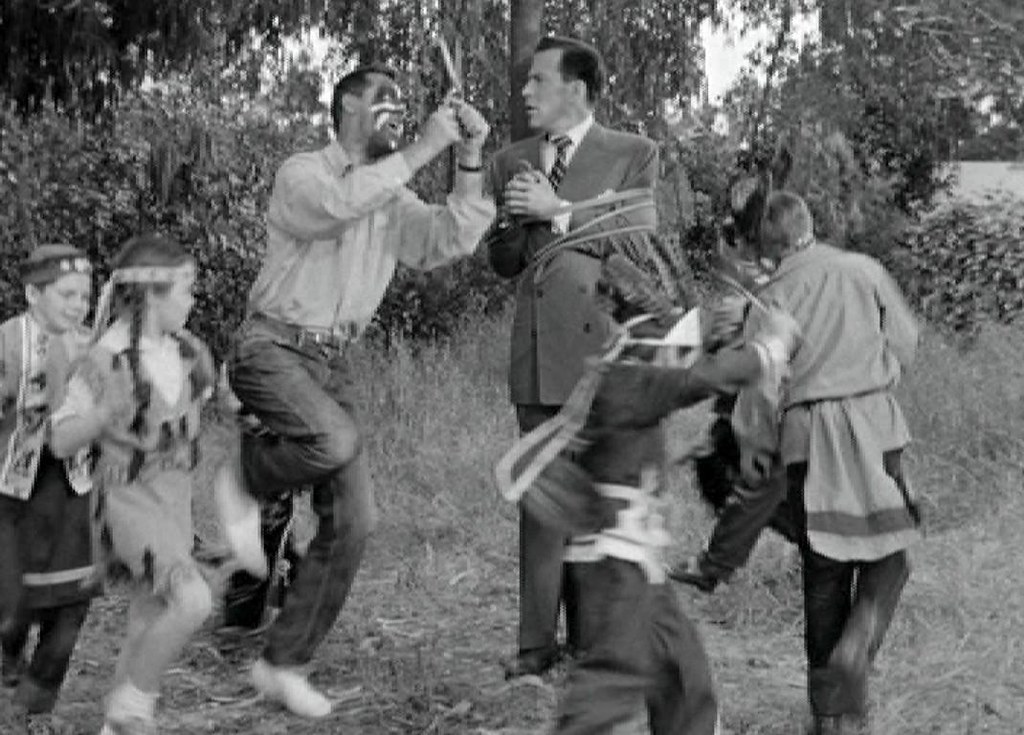

The following stills illustrate Cary Grant and Marilyn Monroe's comic timing.


Director Peter Bogdanovich thought the scenes with Marilyn Monroe worked especially well and wished she had played the Ginger Rodgers role.
Turner Classic movies review of the film contains:
http://www.tcm.com/this-month/article.html?id=495627%7C85242
Between thus picture and the next I want to mention was a 1952 appearance on "The Jack Benny" television show. Then three motion pictures Monroe is always remembered for from 1953. They are director Henry Hathaway's drama "Niagara", the comedy"How to Marry a Millionaire" from director Jean Negulesco and the musical "Gentleman Prefer Blondes" directed also by Howard Hawks.
RIVER OF NO RETURN released April 30, 1954
I must admit this is my favorite Marilyn Monroe motion picture, because we see a softer and vulnerable Monroe and hear her singing voice set against some beautiful scenery.
At first look having Otto Preminger directing this motion picture seems out of place. Preminger was known for the 1944 mystery "Laura" starring Dana Andrews and Gene Tierney, the Joan Crawford, Henry Fonda and Andrews 1947 drama "Daisy Kenyon", or portraying the sadistic German POW Camp Commandant in director Billy Wilder's 1953 "Stalag 17" opposite William Holden. Overlooked was his charming 1946 Oscar nominated musical "Centennial Summer" or even that he directed the adult 1953 comedy "The Moon is Blue" starring William Holden and David Niven.
Robert Mitchum portrays "Matt Calder". "Calder's" been in prison for killing one man in the process of defending another. He's a widower and has come looking for the son he hasn't seen since the boy was an infant.

Marilyn Monroe portrays "Kay Weston". She's a dance hall girl in a gold rush boom town engaged to a gambler.

Tommy Rettig was 12 year old "Mark Calder". Who is roaming the tents of the boom town looking for the father he never knew. He comes under the tender care of "Kay Weston". Whose hard exterior hides a soft heart. In September 1954 Tommy would appear in the first episode of the "Lassie" television series and remain as "Jeff Miller" for 116 episodes, before leaving it.

Rory Calhoun was "Kay's" fiance gambler "Harry Weston". Unlike the non screen credited Marilyn Monroe in her 7th appearance. Calhoun was billed third in 1950's "A Ticket to Tomahawk" and fifth in 1953's "How to Marry a Millionaire". Rory Calhoun would become a television Western star in 79 episodes of "The Texan" starting in 1958.

What I never knew until writing this article was that Monroe and Calhoun's characters had the same last name, but weren't married. As "Kay's" last name is never mentioned in the actual motion picture This was probably only seen on the screenplay. Although it is implied they're a couple at the picture's beginning.
Speaking of the beginning. Over the opening credits the title song "River of No Return" is song by Robert Mitchum. Whose version of the title song for his 1958 feature "Thunder Road" was actually first on the Country/Western charts and almost made it to the top of the Pop charts that year. Most people are unaware of Robert Mitchum's singing career.
The audience first sees "Mark Calder" wondering around the tents of the boom town completely lost looking for his father. Whom, as I have said, he's never seen, because for a reason never told to him. "Mark" lived with his mother until she died. He's wearing a name tag that also says who he's looking for. "Mark" meets "Kay" who takes him to her dressing room until his father hopefully shows up.
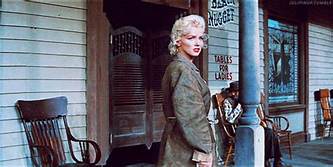
Marilyn Monroe changes her clothing to one of "Kay's" saloon girl outfits and performs the first of three songs in the motion picture. Then "Matt" shows up, he thanks "Kay" and with his son leaves for his farm.
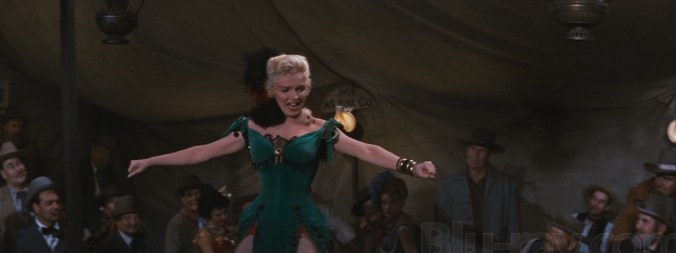
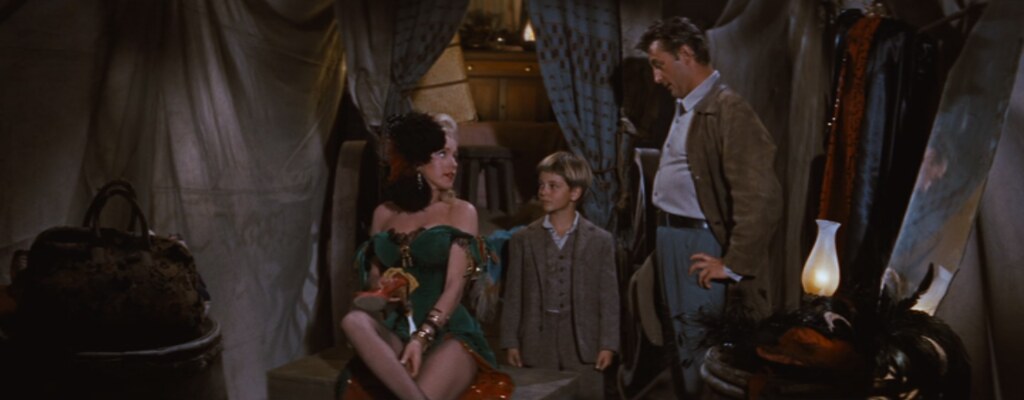
Enter "Harry: having won a deed to a gold mine in a poker game. He tells "Kay" the two of them have to go down river to Council City so he file his claim. The two start out on a log raft. Meanwhile "Matt" has taken "Mark" to his farm and is teaching him how to shoot and live in the outdoors.

While "Kay" and "Harry" are traveling down the river. They run into trouble by the "Calder Farm" and "Matt" has to rescue them. This leads to another song by Marilyn Monroe.

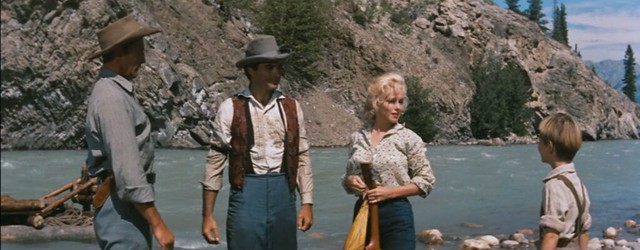
"Harry" wants to buy "Matt's" rifle and horse to go on to Council City riding double.
but "Matt" refuses as he needs both. "Harry" finds his chance, knocks "Matt" unconscious, and steals the rifle and horse."Kay" has decided to stay and take care of the father and son. Whom she is becoming more attached too.

Indians attack the farm and "Kay", "Mark" and "Matt" are forced to flee down the river on the raft.
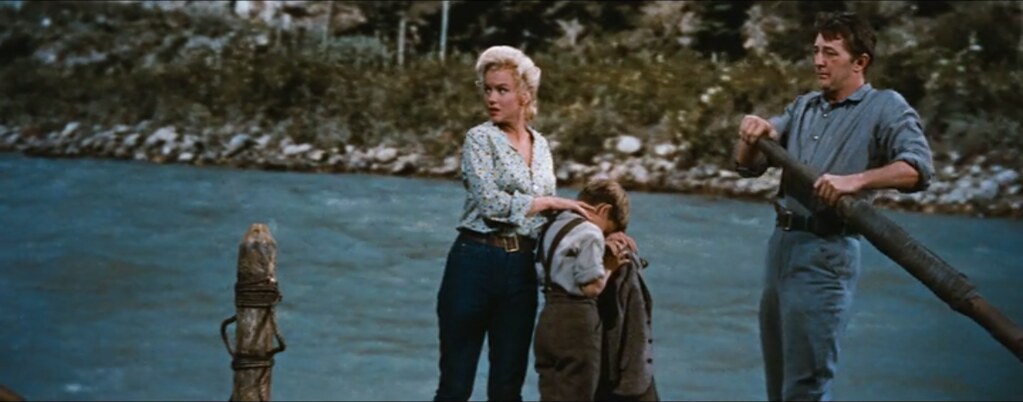
Their first night on the river the three set up camp. "Matt" asks "Kay" how she could consider marrying a man who would endanger a child as "Harry" has done by his theft."Kay" shoots back that "Harry" never killed a man and went to prison. "Mark" overhears the conversation and "Matt" is forced to tell his son the truth about himself and "Kay" wishes she hadn't made her accusation.
"Mark" is conflicted in his mind over what he has heard and the man he has grown to know and love. The following day the three have to shoot the rapids.

After making landfall the feelings between Monroe and Mitchum starts to come out even more. "Kay" starts to appreciate "Matt's' bravery as they continue their journey to Council City.

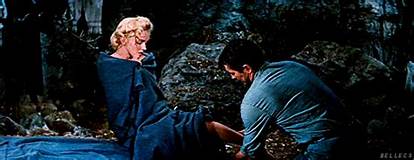
After another Indian attack, fighting off the miners that claim "Harry" cheated in poker to get the deed and a cougar. The trio arrive in Council City and the climatic confrontation between "Mark's" father and "Harry" takes place.
In a general store "Matt" is inspecting a new rifle when "Harry" shows up and shoots at him. "Matt' takes the rifle and shoots and kills "Harry' in the back. "Mark" now realizes that there are times when a man must react to circumstances that can result in another's death.
"Kay" returns to a saloon and Monroe sings another song in the film. Then "Matt" shows up, crabs her, flings her over his shoulder and takes her off to be with him and "Mark".

The final scene has Monroe throwing her saloon shoes into the dirt from the buckboard the three are now riding upon.
TV Guide calls "River of No Return"
THE MISFITS released February 1, 1961
This was Marilyn Monroe's 33rd on screen appearance and her last. She would die on August 5, 1962. This was Clark Gable's 82nd on screen appearance and his last. He had died on November 16, 1960 from a sudden heart attack.This was Montgomery Clift's 15th on screen appearance. He would follow this film with Stanley Kramer's 1961 "Judgement at Nuremberg" and in 1962 John Huston's "Freud".
The story was written by playwright Arthur Miller. At the time of filming he was still married to Marilyn Monroe, but before the end of 1961 the two would be divorced.
This was Monroe's second motion picture by director John Huston.
Clark Gable portrayed "Gay Langland", Marilyn Monroe was "Roslyn Tabor" and Montgomery Clift was "Perce Howland".

Absent minded chemist "Dr. Barnaby Fulton" is attempting to develop for the "Oaxley Company" an elixir of youth. His boss is urging him on. While thinking of the profits such a product will bring the company. "Esther", one of the test chimpanzees has gotten loose. "Esther" than proceeds to mix a bunch of chemicals together and puts the mixture into the water cooler.
Unaware of what "Esther" has done. "Dr. Fulton" decides to test his latest mixture on himself and then washes it down with water from the cooler. The result is that he is now acting like a 20 year old.
Next "Fulton" spends part of the day with the bosses Secretary "Lois Laurel". The chemistry between Monroe and Grant goes full speed. Below "Fulton" trades his car for a 1950's "Hot Rod".


"Edwina Fulton" learning that the elixir works. Take the flask and drinks some and also washes it down with water from the water cooler. She starts acting like a 20 year old school girl prankster and even calls her ex-boyfriend, "Hank Entwhistle", played by Hugh Marlowe.

Soon others from the company drink out of the cooler and act younger, but which each drink the same character takes. They become even younger until they're acting like elementary grade children. Below Grant, Marlowe and a group of kids playing Cowboys and Indians.

The following stills illustrate Cary Grant and Marilyn Monroe's comic timing.

Director Peter Bogdanovich thought the scenes with Marilyn Monroe worked especially well and wished she had played the Ginger Rodgers role.
Turner Classic movies review of the film contains:
Howard Hawks' screwball comedy, Monkey Business (1952), is a case in point. Although it contains a handful of very funny sequences and features the inspired comic pairing of Cary Grant and Marilyn Monroe in several scenes, the picture is highly derivative of 1938's Bringing Up Baby, which also starred Grant and was directed by Hawks. The absurd plot of Monkey Business also kicks into gear via an animal that gets referenced in the title ("Baby," in case you haven't seen the first film, was a troublemaking leopard.)Ginger Rodgers is only mentioned in the review as portraying "Edwina".
http://www.tcm.com/this-month/article.html?id=495627%7C85242
Between thus picture and the next I want to mention was a 1952 appearance on "The Jack Benny" television show. Then three motion pictures Monroe is always remembered for from 1953. They are director Henry Hathaway's drama "Niagara", the comedy"How to Marry a Millionaire" from director Jean Negulesco and the musical "Gentleman Prefer Blondes" directed also by Howard Hawks.
RIVER OF NO RETURN released April 30, 1954
I must admit this is my favorite Marilyn Monroe motion picture, because we see a softer and vulnerable Monroe and hear her singing voice set against some beautiful scenery.
Robert Mitchum portrays "Matt Calder". "Calder's" been in prison for killing one man in the process of defending another. He's a widower and has come looking for the son he hasn't seen since the boy was an infant.

Marilyn Monroe portrays "Kay Weston". She's a dance hall girl in a gold rush boom town engaged to a gambler.

Tommy Rettig was 12 year old "Mark Calder". Who is roaming the tents of the boom town looking for the father he never knew. He comes under the tender care of "Kay Weston". Whose hard exterior hides a soft heart. In September 1954 Tommy would appear in the first episode of the "Lassie" television series and remain as "Jeff Miller" for 116 episodes, before leaving it.

Rory Calhoun was "Kay's" fiance gambler "Harry Weston". Unlike the non screen credited Marilyn Monroe in her 7th appearance. Calhoun was billed third in 1950's "A Ticket to Tomahawk" and fifth in 1953's "How to Marry a Millionaire". Rory Calhoun would become a television Western star in 79 episodes of "The Texan" starting in 1958.

What I never knew until writing this article was that Monroe and Calhoun's characters had the same last name, but weren't married. As "Kay's" last name is never mentioned in the actual motion picture This was probably only seen on the screenplay. Although it is implied they're a couple at the picture's beginning.
Speaking of the beginning. Over the opening credits the title song "River of No Return" is song by Robert Mitchum. Whose version of the title song for his 1958 feature "Thunder Road" was actually first on the Country/Western charts and almost made it to the top of the Pop charts that year. Most people are unaware of Robert Mitchum's singing career.
The audience first sees "Mark Calder" wondering around the tents of the boom town completely lost looking for his father. Whom, as I have said, he's never seen, because for a reason never told to him. "Mark" lived with his mother until she died. He's wearing a name tag that also says who he's looking for. "Mark" meets "Kay" who takes him to her dressing room until his father hopefully shows up.
Marilyn Monroe changes her clothing to one of "Kay's" saloon girl outfits and performs the first of three songs in the motion picture. Then "Matt" shows up, he thanks "Kay" and with his son leaves for his farm.


Enter "Harry: having won a deed to a gold mine in a poker game. He tells "Kay" the two of them have to go down river to Council City so he file his claim. The two start out on a log raft. Meanwhile "Matt" has taken "Mark" to his farm and is teaching him how to shoot and live in the outdoors.

While "Kay" and "Harry" are traveling down the river. They run into trouble by the "Calder Farm" and "Matt" has to rescue them. This leads to another song by Marilyn Monroe.


"Harry" wants to buy "Matt's" rifle and horse to go on to Council City riding double.
but "Matt" refuses as he needs both. "Harry" finds his chance, knocks "Matt" unconscious, and steals the rifle and horse."Kay" has decided to stay and take care of the father and son. Whom she is becoming more attached too.

Indians attack the farm and "Kay", "Mark" and "Matt" are forced to flee down the river on the raft.

Their first night on the river the three set up camp. "Matt" asks "Kay" how she could consider marrying a man who would endanger a child as "Harry" has done by his theft."Kay" shoots back that "Harry" never killed a man and went to prison. "Mark" overhears the conversation and "Matt" is forced to tell his son the truth about himself and "Kay" wishes she hadn't made her accusation.
"Mark" is conflicted in his mind over what he has heard and the man he has grown to know and love. The following day the three have to shoot the rapids.

After making landfall the feelings between Monroe and Mitchum starts to come out even more. "Kay" starts to appreciate "Matt's' bravery as they continue their journey to Council City.
After another Indian attack, fighting off the miners that claim "Harry" cheated in poker to get the deed and a cougar. The trio arrive in Council City and the climatic confrontation between "Mark's" father and "Harry" takes place.
In a general store "Matt" is inspecting a new rifle when "Harry" shows up and shoots at him. "Matt' takes the rifle and shoots and kills "Harry' in the back. "Mark" now realizes that there are times when a man must react to circumstances that can result in another's death.
"Kay" returns to a saloon and Monroe sings another song in the film. Then "Matt" shows up, crabs her, flings her over his shoulder and takes her off to be with him and "Mark".
The final scene has Monroe throwing her saloon shoes into the dirt from the buckboard the three are now riding upon.
TV Guide calls "River of No Return"
simple, frequently charming, and beautifully photographed film blessed with fine performances and great teamwork from Robert Mitchum and Marilyn Monroe in an enjoyable, engaging little Western that never fails to entertain.
THE MISFITS released February 1, 1961
This was Marilyn Monroe's 33rd on screen appearance and her last. She would die on August 5, 1962. This was Clark Gable's 82nd on screen appearance and his last. He had died on November 16, 1960 from a sudden heart attack.This was Montgomery Clift's 15th on screen appearance. He would follow this film with Stanley Kramer's 1961 "Judgement at Nuremberg" and in 1962 John Huston's "Freud".
The story was written by playwright Arthur Miller. At the time of filming he was still married to Marilyn Monroe, but before the end of 1961 the two would be divorced.
This was Monroe's second motion picture by director John Huston.
Clark Gable portrayed "Gay Langland", Marilyn Monroe was "Roslyn Tabor" and Montgomery Clift was "Perce Howland".

The two main supporting roles were Thelma Ritter as "Isabelle Steers" and Eli Wallach as "Gudio".

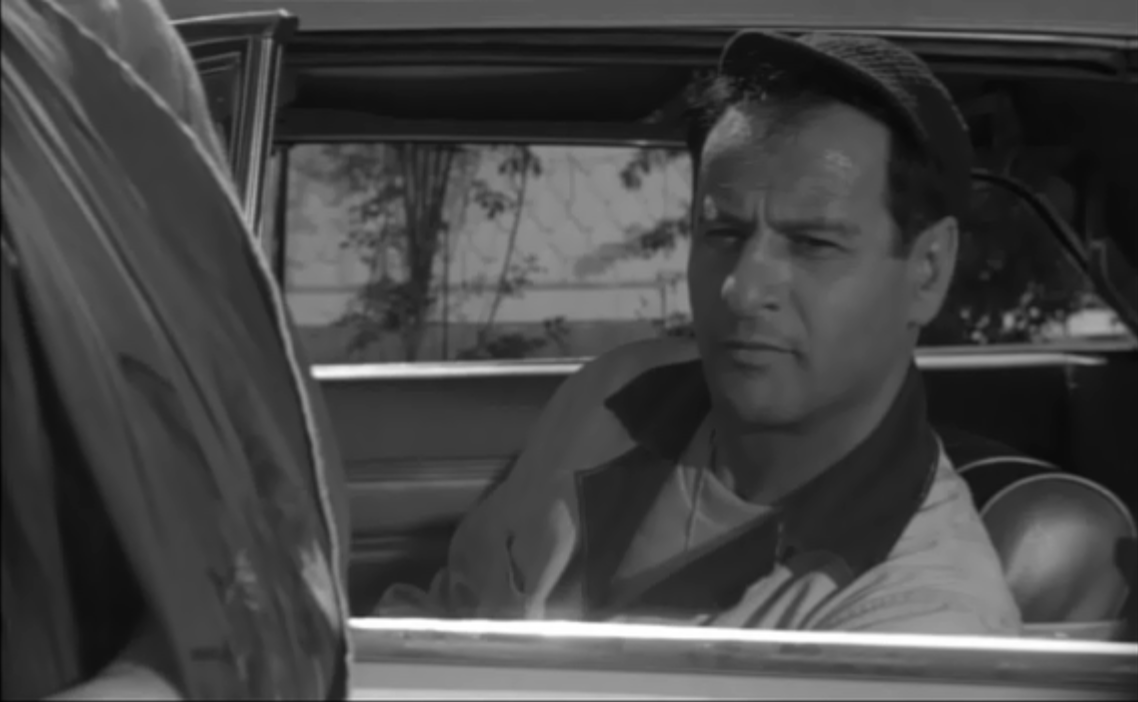
This was not an easy production for the stars and crew. It was shot on the Nevada Desert in 108 degree heat. The story by Miller kept changing during the production and the actors were constantly relearning lines. Not to mention the tension between Arthur Miller and his then wife Marilyn Monroe affecting everyone.
While director John Huston was constantly drinking and even fell asleep, on set, delaying the shoot. Along with disappearing to gamble at local casinos. With her dissolving marriage, similarly, Monroe started drinking and taking several prescription drugs. These facts were only an overview of the major problems making "The Misfits".
The story starts with 30 year old "Roslyn Tabor", in Reno, Nevada, filling for a "quickie six week divorce" from her husband "Raymond Tabor" portrayed by Kevin McCarthy.
This is followed by "Roslyn" going with her landlady "Isabelle Steers" to "Harrah's Reno" for drinks in the bar.
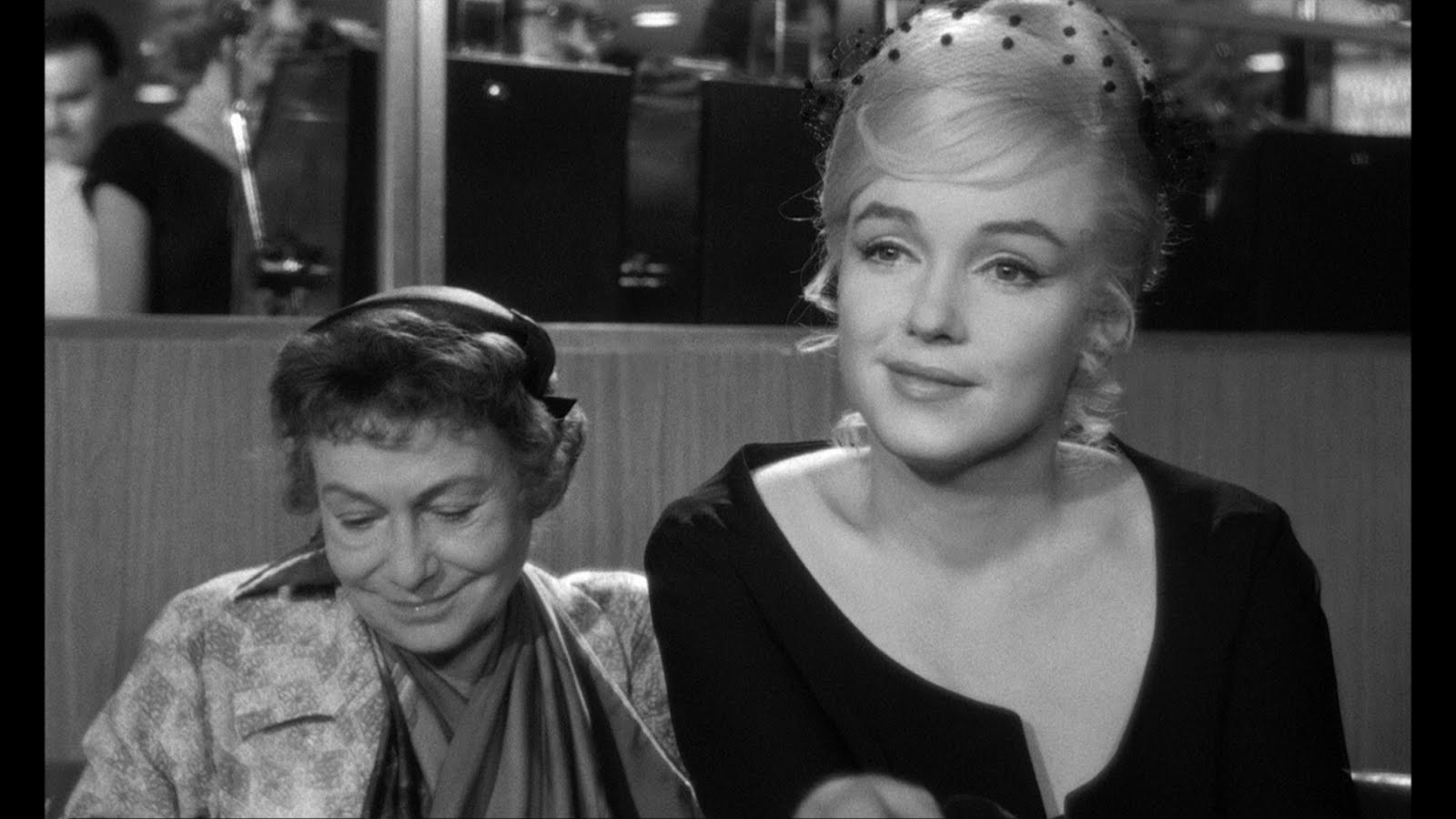
There "Rosyln" meets aging cowboy "Gaylord 'Gay' Langland" and "Gay's" truck diver friend "Guido". The two women pair up with the two men.
"Isabelle" and "Guido" go off together and "Gay" and "Roslyn" move into "Guido's" unfinished house. All four have gone through divorces and in the case of "Gay". He has children that he wished he had been closer too. One morning "Isabelle" and "Guido" return and "Gay" makes a suggestion that the four round up mustangs to sell.
They decide to go to Dayton, Nevada, to watch a rodeo. On the way they meet "Perce" who needs a ten dollar entry fee. "Gay" offers to pay the fee, if "Perce" joins the others to catch and break mustangs. When "Guido" explains how the rodeo horses are made to buck by wearing an irritating flank strap. "Roslyn" becomes very upset over the treatment and believes the horses should be free.
"Perce" is thrown and injured by a bucking horse and "Roslyn" wants him to go to the hospital. Instead he rides a bull and get thrown once again and has a very bad head injury.
Then the picture follows the four finding and breaking mustangs, gambling and drinking. In Arthur Miller's evolving screenplay the idea of freeing the mustangs starts to become a allegory for the lives of "Roslyn", "Gay", "Perce" "Isabelle" and "Gudio".





"Roslyn" wants to release the horses they've caught and broke. There is a debate over it. "Roslyn" has also come between the friendship of "Guido" and "Gay".
In the end the audience see "Roslyn" and "Gay" driving away and her telling him she's leaving,

"The Misfits" was expected to be a major motion picture. You had Gable, Monroe and Clift as leads, Huston as a director and Miller as writer. Adding the gossip of the tabloids about Marilyn and Arthur. Followed by the sudden death of Clark Gable prior to release, but "The Misfits" was a box off flop. It didn't even make back the money it cost to film and release. Huston was attacked for filming the movie in black and white. Although he would be nominated for Best Director by the "Directors Guild of America".
However, the years have been kind to the film and cast. Today most critics consider "The Misfits" an excellent character study that contained Clark Gable's finest performance. The website "Rotten Tomatoes" has a 100 percent rating for the motion picture.
Some people might want to read more into the fact that John Huston gave Marilyn Monroe both her first and last major on screen roles..
They might also want to make something out of the fact that Clark Gable was 59 year old when he made "The Misfits" and Marilyn Monroe was 35 years longer. That as a young child he was her favorite actor and she fantasized that Gable was her father, but what we are left with are:
Five Marilyn Monroe Pictures and Five Different Marilyn Monroe's.



No comments:
Post a Comment